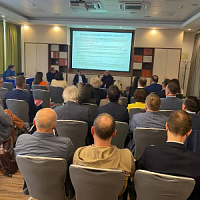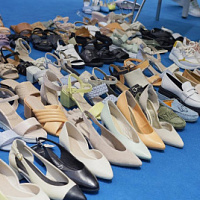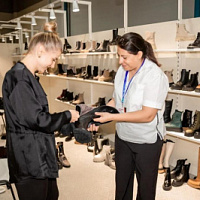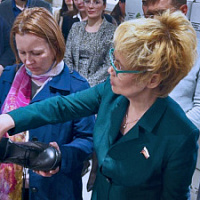
Is the market ready for labeling? Opinions of the leaders of the shoe industry

Much has been written about mandatory shoe marking, which has been introduced in Russia since 1 on March 2020, but we decided once again to ask the business itself about its readiness to work on the new system. There were three questions that we voiced:
- How is the preparation for labeling going in your company?
- What are your expectations?
- Do you share the positive mood of the authors and supporters of the idea of mandatory labeling that illegal products will leave the Russian market?
Representatives of companies talk in detail about their current situation.
 Shahin Asadov - CEO of Riker Vostok
Shahin Asadov - CEO of Riker Vostok“We already supply labeled shoes, but there are problems with the automation of the transmission and processing of data in the central distribution center. Retailers still have unresolved problems with returns, transfers, etc. I categorically do not share the positive mood regarding even a reduction in illegal products (counterfeit, plagiarism). I believe that anyone who thinks differently is either an incorrigible optimist, whose optimism prevails over rational analysis, or has his own interests and hopes to catch fish in troubled waters (I understand them, because at least the motive is clear), or a naive ignoramus ".
 Vitaly Stepin - Deputy CEO Baden
Vitaly Stepin - Deputy CEO Baden“We are actively preparing for product labeling, but due to the lack of a clear roadmap and the constant introduction of changes to the guidelines by the MDTC, the preparation process is greatly complicated. The latest information from the MDCT that aggregation codes can only be assigned to identical products in a package has put all market participants in a difficult position. This is due to the fact that shoe size is an integral characteristic of shoes, and in order for the same goods to be inside the package, they must be not just a single article, but also one size. And this is impossible, because any client, ordering shoes, wants to receive it in a dimensional grid from 36 to 41 size in one box.
At the same time, large market players will not be able to do without aggregation codes either, because if they are absent, when the goods arrive at the warehouses, they will have to be taken in pairs, and this will paralyze the warehouse. Therefore, we are forced to introduce our own aggregation codes, but they will not be available in the MDG base, and therefore will not be available to our wholesale customers. As a result, when accepting goods, customers will have to open each box and register each pair separately, and this will greatly complicate and slow down the process of placing goods on store shelves, especially in large chains. And this is just one of the problems that we constantly face in the process of introducing labeling. There is very little time left before placing orders and starting the marking process, and there are still no clear recommendations.
“We very much hope that illegal products will leave the market, because otherwise we will get nothing but difficulties and additional costs.”
 Alexei Kozlov - Executive Director of WORTMANN GROUP in Russia
Alexei Kozlov - Executive Director of WORTMANN GROUP in Russia“All five companies included in the WORTMANN GROUP in Russia participate in a pilot project. At the moment, we are finalizing our information systems in Russia and Germany and are building logistics processes for the successful launch of mandatory labeling for us and our customers.
Today, we fit into the planned implementation timelines and do not see any obstacles that could prevent us from implementing the project by the date established by law - March 1 2020 of the year.
We share a positive mood and are confident that illegal products, if they do not completely disappear from the market, will at least decrease their volume several times. Of course, to achieve this result, it will take some time and effort on the part of both the business community and government bodies. ”
 Dmitry Karpenko - IT Director of the Obuv Rossii GC
Dmitry Karpenko - IT Director of the Obuv Rossii GC“We participated in a pilot labeling project, in general, we have been working on this task for more than a year. At the moment, all the main business processes and technologies have been developed. The codes are generated in an automated mode: we get the codes, print them out and put them on the boxes. We can say that our corporate IT systems are ready for the movement of goods according to the new scheme.
The need to track the movement of goods at every stage, from the manufacturer to the sale in the store, required our company to slightly change the logistics and a number of business processes. The implementation of marking is associated with the costs of acquiring additional equipment (data collection terminals), expanding disk space (since the volume of processed information will increase by several times), and developing software (we did most of the work ourselves, but we did use external ones to solve specific problems) contractors).
At the moment, several technical issues remain unresolved: so far, group codes have not been generated in the system of a single labeling operator (CRTC) (for boxes on 12 pairs, which usually pack shoes, and for trucks that deliver goods through customs); Also, the central distribution system does not provide the data processing speed that is necessary for us, so it is not possible to download a large number of codes at one time; some stages of the goods movement are not explained (for example, returning goods to the store). Since the project is quite complex and involves a large number of participants, it requires more time for implementation and revision. We think that by the time of the prohibition of the turnover of unmarked shoes in Russia (since February 2020 of the year), these issues will be resolved.
The shoe market is the third largest consumer market in the country. At the same time, there is a rather large share of illegal imports on the market, which, depending on the price segment, can reach 30%. Therefore, labeling, which makes the movement of all goods transparent, will bring the market to a legal field. The beneficiaries of this process are three main aspects: the state, which is increasing the tax base; professional manufacturers and retailers who will have the opportunity to increase market share due to the departure of unscrupulous players; consumers who will know the history of the goods and receive an additional guarantee of quality.
It is too early to judge the results of the project, we are still in a transitional stage. We see that marking significantly changes the business processes and logistics of the company, increases the volume of electronic document management at times, leads to additional costs. At the same time, it will allow the market to move to a new stage of development, since many companies, especially small ones, will be forced to automate those business processes that they did not strive to automate earlier. Marking will also make the competition in the market more fair, which will ultimately benefit professional players - retailers and manufacturers. ”
 Eldar Schaffner - Sales Director MARCO TOZZI in Eastern Europe and Russia
Eldar Schaffner - Sales Director MARCO TOZZI in Eastern Europe and Russia“Our company began phased preparation for labeling from the moment of the official announcement of the impending changes in the legal regulation in the shoe industry. Currently, we are in the normal mode of shipment of fully labeled products to our partners.
Of course, there are some questions about the functioning of the new system - returns, rejects, reboots, etc., which one way or another arise in the manufacturer-supplier-client-end-consumer chain. Any undertaking of something large-scale involves problems of a similar nature at the initial stage, but, as practice shows, over time, the whole mechanism is debugged and begins to work like a clock. Therefore, the mood, rather, can be called positive.
Do I share the positive mood that illegal products will leave the market? In this matter, there is even a feeling of confidence. At a minimum, the competitive environment will become transparent, the rules of the game are clear and equal for all market participants. ”
 Dmitry Lavrukhin - founder of Tandem-Logistics
Dmitry Lavrukhin - founder of Tandem-Logistics“The labeling system is completely ready and works for our customers. We have already imported shoes with marking codes into Russia. The mood is very positive, because after the 1 of March 2020, all market players will be in the same position, and I hope that such concepts as gray import and smuggling disappear forever! ”
 Irina Lavrukhina - CEO of the AXA brand
Irina Lavrukhina - CEO of the AXA brand “AXA is a participant in a pilot project, and today it is almost ready for labeling. We tested 2 marking methods: in production in Italy and in prefabricated warehouses in Germany. The results are positive. Correct minor flaws. As for illegal products on the market, in my opinion, it will decrease, but it will not go away completely. ”
“As for labeling, at Salamander, everything is going according to plan. We have already prepared all the consolidating warehouses, purchased the necessary equipment and updated the software. Now we are setting up protocols and integrating with the MDGs. ”
“We are observing the process of preparing for marking shoes. "We do not believe in leaving the market of illegal goods and do not share the joys of competitors."
 Pavel Savin - GEOX Sales Manager in Russia
Pavel Savin - GEOX Sales Manager in Russia“All leading international companies have applied for a tender to select the best labeling company. We are waiting for information. We always believe in the best that the market will grow, that customers and the retail price, I hope, innovations will not affect that there will be less gray imports, we hope that there will be no fakes at all. We are a premium segment, it is very important for us. ”
Egorievsk-Obuv AO (Kotofey TM) in the Marking (Shoes) project since the beginning of the experiment: takes part both in the design and expert group under the Ministry of Industry and Trade of Russia and in the expanded expert group Obuv under the industry associations. In the framework of the project on October 1 of October 2019, in our opinion, the processes of putting brands into circulation during production were implemented at a satisfactory level throughout the market, while the processes of accounting for marked shoes and accounting for the transfer of brands when transferring shoes were implemented at the business logic level labeling system, but there are still no acceptable software solutions on which the shoe market participants with small IT competencies could work. Accordingly, we, as a manufacturer, can produce marked shoes, but its further accounting and transfer between the manufacturer-distributor-retail point of sale is now possible only in deferred mode, followed by recording information in the GIS MP. The undisputed leader in accounting solutions for small and medium-sized businesses - the company 1С has already twice postponed the release dates of labeling processes in its products. In addition, there are still approvals for the implementation of customs clearance, as well as a lot of issues related to online trading. All this does not yet allow us to talk about the readiness of the market for the implementation of the entire labeling system.
We expect that 2020 year in any case for the entire shoe market will pass in the mode of implementation, testing and debugging, marking processes. Of course, this will require additional time and financial resources in all parts of the distribution chain. At the same time, the launch of the traceability system, by and large, will give the regulatory authorities a tool for quickly identifying the origin of shoes. Further “whitening” of the market depends, inter alia, on how this tool will be used. We hope that in the medium term - 3-5 years - this will reduce the counterfeit of shoes to the level of 5-10%. "
Material prepared by Ekaterina Sergeeva
This article was published in the 171 issue of the print version of the magazine.
| Please rate the article |
Materials on the topic

Results of the round table of shoemakers with the Ministry of Industry and Trade of the Russian Federation, CRPT, NOBS and Wildberries

World Footwear Yearbook: Global footwear production reaches 23,9 billion pairs and is back to pre-pandemic levels

How to double the sales of a shoe store?

New direction of exhibitions in Alma-Ata: Euro Shoes @ Elite Line & CAF

Round table with representatives of shoe factories of Dagestan with the support of the Ministry of Industry and Trade and NOBS
Popular
 Coach turned to Big Data analysis and won the interest of a young audience
American handbag brand Coach has planned the success of its Tabby model among a younger audience, Generation Z, by turning to big data analysis, abandoning traditional and analogue tools, such as human intuition or the ability of any executive to sense “which way the wind will blow,” writes B.O.F.
Coach turned to Big Data analysis and won the interest of a young audience
American handbag brand Coach has planned the success of its Tabby model among a younger audience, Generation Z, by turning to big data analysis, abandoning traditional and analogue tools, such as human intuition or the ability of any executive to sense “which way the wind will blow,” writes B.O.F.
 IDOL updates the concept
The IDOL brand, part of the Melon Fashion Group portfolio, opened the first flagship in an updated concept in the Aviapark shopping center in Moscow.
IDOL updates the concept
The IDOL brand, part of the Melon Fashion Group portfolio, opened the first flagship in an updated concept in the Aviapark shopping center in Moscow.
 Seven “sins” of the shoe business. How do owners harm the company with their own hands?
Why is Company X able to create a strong, profitable brand, but Company Y is struggling to make ends meet? Many people prefer to attribute success to luck, luck, or the support of strong patrons. And few people ask themselves the question: “What am I doing wrong?” Moreover, many entrepreneurs begin to harm their business from the first day of its opening. In this article, together with SR expert in the field of fashion business management and development, Maria Gerasimenko, we will look at the 7 main “sins” that business owners commit using specific examples.
Seven “sins” of the shoe business. How do owners harm the company with their own hands?
Why is Company X able to create a strong, profitable brand, but Company Y is struggling to make ends meet? Many people prefer to attribute success to luck, luck, or the support of strong patrons. And few people ask themselves the question: “What am I doing wrong?” Moreover, many entrepreneurs begin to harm their business from the first day of its opening. In this article, together with SR expert in the field of fashion business management and development, Maria Gerasimenko, we will look at the 7 main “sins” that business owners commit using specific examples.
 Current techniques in lighting a shoe store
Today, walking through the galleries of shopping centers, we see a variety of formats of offline stores. New concepts of retail spaces attract with an individual, memorable design. In a certain sense, they are an element of the show, a tool through which the buyer receives a new and interesting experience. Together with SR expert in the field of lighting technology in retail, Tatyana Ryzhova, we will look at current lighting design techniques for modern shoe stores, which we will see more and more often in new retail outlets in the near future.
Current techniques in lighting a shoe store
Today, walking through the galleries of shopping centers, we see a variety of formats of offline stores. New concepts of retail spaces attract with an individual, memorable design. In a certain sense, they are an element of the show, a tool through which the buyer receives a new and interesting experience. Together with SR expert in the field of lighting technology in retail, Tatyana Ryzhova, we will look at current lighting design techniques for modern shoe stores, which we will see more and more often in new retail outlets in the near future.
 Louis Vuitton opens a new factory in Italy
Louis Vuitton has opened its second shoe factory in Italy. After opening the first one in Fiesso d'Artico in Veneto, the LVMH flagship brand has just opened a new production site dedicated to this category of footwear in the industrial zone of Civitano in the Marche region. There is also another brand production facility in Tuscany, where bags and leather accessories are produced, writes fr.fashionnetwork.com.
Louis Vuitton opens a new factory in Italy
Louis Vuitton has opened its second shoe factory in Italy. After opening the first one in Fiesso d'Artico in Veneto, the LVMH flagship brand has just opened a new production site dedicated to this category of footwear in the industrial zone of Civitano in the Marche region. There is also another brand production facility in Tuscany, where bags and leather accessories are produced, writes fr.fashionnetwork.com.
 The Euro Shoes@CAF exhibition will be held in Almaty
From March 11 to 13, the Euro Shoes@CAF (Central Asia Fashion) exhibition will be held in Almaty at the Atakent exhibition complex. The exhibition, which is the largest international event in the fashion industry in Central Asia, will present collections of clothing, shoes and accessories.
The Euro Shoes@CAF exhibition will be held in Almaty
From March 11 to 13, the Euro Shoes@CAF (Central Asia Fashion) exhibition will be held in Almaty at the Atakent exhibition complex. The exhibition, which is the largest international event in the fashion industry in Central Asia, will present collections of clothing, shoes and accessories.
 Euro Shoes will start operating on February 19 in Moscow!
The winter session of the international exhibition of footwear and accessories Euro Shoes premiere collection will be held in Moscow at the Expocenter from February 19 to 22. The organizers promise the presence of all the main participants at the exhibition, as well as new names from Europe, Asia and Russia.
Euro Shoes will start operating on February 19 in Moscow!
The winter session of the international exhibition of footwear and accessories Euro Shoes premiere collection will be held in Moscow at the Expocenter from February 19 to 22. The organizers promise the presence of all the main participants at the exhibition, as well as new names from Europe, Asia and Russia.
 American buyers couldn't buy Birkin bags and sued Hermès
French fashion house Hermès is facing a lawsuit in California from two customers who were unable to purchase exclusive Birkin bags. The fashion house is accused of unfair commercial practices.
American buyers couldn't buy Birkin bags and sued Hermès
French fashion house Hermès is facing a lawsuit in California from two customers who were unable to purchase exclusive Birkin bags. The fashion house is accused of unfair commercial practices.
 Why Rendez-Vous and Yandex Lavka released a “bread bag”
Shoe retailer Rendez-Vous announced the launch of a spring collaboration with Yandex Lavka and released a roll that resembles the shape of a woman’s handbag. This “Bread Bag” is presented in the Yandex.Lavka application at a price of 249 rubles. On the product packaging there is a promotional code for 1000 rubles, which can be spent in the Rendez-Vous network.
Why Rendez-Vous and Yandex Lavka released a “bread bag”
Shoe retailer Rendez-Vous announced the launch of a spring collaboration with Yandex Lavka and released a roll that resembles the shape of a woman’s handbag. This “Bread Bag” is presented in the Yandex.Lavka application at a price of 249 rubles. On the product packaging there is a promotional code for 1000 rubles, which can be spent in the Rendez-Vous network.
 Camper has released innovative sneakers - designers
Spanish brand Camper's new Roku sneaker features six interchangeable components to create up to 64 different looks and color combinations. Roku means "six" in Japanese.
Camper has released innovative sneakers - designers
Spanish brand Camper's new Roku sneaker features six interchangeable components to create up to 64 different looks and color combinations. Roku means "six" in Japanese.
 Turkish brand Vaneda on Euro Shoes
Street style, sport, outdoor, military – the main style directions of footwear of the company from Turkey
Turkish brand Vaneda on Euro Shoes
Street style, sport, outdoor, military – the main style directions of footwear of the company from Turkey
 Christian Louboutin presented a collection in a cowboy style
At the Loubi Show in Paris, the French luxury brand Christian Louboutin presented its fall 2024 collection, following the trend - in the style of the Wild West. It included cowboy boots and rhinestone loafers.
Christian Louboutin presented a collection in a cowboy style
At the Loubi Show in Paris, the French luxury brand Christian Louboutin presented its fall 2024 collection, following the trend - in the style of the Wild West. It included cowboy boots and rhinestone loafers.
 Fashion Week takes place in Moscow
Fashion Week takes place in the Russian capital. Events include fashion shows, markets where you can purchase clothes, bags and accessories, and a B2B Showroom for fashion industry professionals.
Fashion Week takes place in Moscow
Fashion Week takes place in the Russian capital. Events include fashion shows, markets where you can purchase clothes, bags and accessories, and a B2B Showroom for fashion industry professionals.
 We are ready for active development in the Russian market
Friedrich Naumann, CEO of the Tamaris brand, told Shoes Report about the company’s ambitious plans, business development in Russia and expansion of the retail network, and also shared details about new collections and launches.
We are ready for active development in the Russian market
Friedrich Naumann, CEO of the Tamaris brand, told Shoes Report about the company’s ambitious plans, business development in Russia and expansion of the retail network, and also shared details about new collections and launches.
 Fashion trends Fall-Winter 2023/24 for commercial footwear purchases
Permanent contributor to Shoes Report. Elena Vinogradova, an expert in sales and purchases in the fashion business, prepared an overview of the trends for the autumn-winter 2023/24 season especially for us.
Fashion trends Fall-Winter 2023/24 for commercial footwear purchases
Permanent contributor to Shoes Report. Elena Vinogradova, an expert in sales and purchases in the fashion business, prepared an overview of the trends for the autumn-winter 2023/24 season especially for us.
 MSCHF and Crocs launch "Big Yellow Boots"
Creator of the Big Red Boots, Brooklyn brand MSCHF has teamed up with American plastic clog and sandal brand Crocs for another oversized shoe. The new Big Yellow Boots will go on sale on August 9th.
MSCHF and Crocs launch "Big Yellow Boots"
Creator of the Big Red Boots, Brooklyn brand MSCHF has teamed up with American plastic clog and sandal brand Crocs for another oversized shoe. The new Big Yellow Boots will go on sale on August 9th.
 Five rules of professional lighting for a shoe store - something that is relevant in any season
When developing a lighting concept for shoe retailers, it is important to take into account not only the history of the brand, the architectural content of the premises, the target audience of the stores, but also the seasonality of the goods. With the onset of the cold season, client preferences change: bright weightless shoes are replaced by more massive models in discreet dark colors. Despite significant differences in summer and winter collections, the overall philosophy of the brand, its recognition should remain unchanged at any time of the year. Tatyana Ryzhova, an SR lighting expert in fashion retail, has identified five basic rules for a competent lighting concept for a shoe store for readers of the magazine, which will help to present winter assortment to customers in a winning way.
Five rules of professional lighting for a shoe store - something that is relevant in any season
When developing a lighting concept for shoe retailers, it is important to take into account not only the history of the brand, the architectural content of the premises, the target audience of the stores, but also the seasonality of the goods. With the onset of the cold season, client preferences change: bright weightless shoes are replaced by more massive models in discreet dark colors. Despite significant differences in summer and winter collections, the overall philosophy of the brand, its recognition should remain unchanged at any time of the year. Tatyana Ryzhova, an SR lighting expert in fashion retail, has identified five basic rules for a competent lighting concept for a shoe store for readers of the magazine, which will help to present winter assortment to customers in a winning way.
 I doubt and object: how to find an approach to difficult clients?
How good and serene would be the work of a salesperson if the customers were calm, cheerful, always knew exactly what they wanted, and bought, bought, bought! It is a pity that this is possible only in dreams. Therefore, we will not dream, but we will act. Together with Maria Gerasimenko, a permanent author of SR, we understand the doubts and objections of buyers and build a strategy for working with them. Our expert pays special attention to the two main objections of buyers, on which 82% of sales are lost.
I doubt and object: how to find an approach to difficult clients?
How good and serene would be the work of a salesperson if the customers were calm, cheerful, always knew exactly what they wanted, and bought, bought, bought! It is a pity that this is possible only in dreams. Therefore, we will not dream, but we will act. Together with Maria Gerasimenko, a permanent author of SR, we understand the doubts and objections of buyers and build a strategy for working with them. Our expert pays special attention to the two main objections of buyers, on which 82% of sales are lost.
 EURO SHOES presents an updated section of the GLOBAL SHOES exhibition with collections of shoe and bag brands from Asian countries
EURO SHOES premiere collection is expanding. Along with the traditional pool of leading European footwear brands from Germany, Spain, Italy and Turkey, several dozen footwear and bag brands from the Middle Kingdom will be presented in the GLOBAL SHOES section at the Moscow Expocentre from August 29 to September 1.
EURO SHOES presents an updated section of the GLOBAL SHOES exhibition with collections of shoe and bag brands from Asian countries
EURO SHOES premiere collection is expanding. Along with the traditional pool of leading European footwear brands from Germany, Spain, Italy and Turkey, several dozen footwear and bag brands from the Middle Kingdom will be presented in the GLOBAL SHOES section at the Moscow Expocentre from August 29 to September 1.
 World Footwear Yearbook: Global footwear production reaches 23,9 billion pairs and is back to pre-pandemic levels
The Portuguese association of shoe manufacturers APICCAPS published the 13th edition of the international statistical bulletin World Footwear Yearbook for 2023, according to which in 2022 the production and export of shoes worldwide increased by 7,6% and 9%, respectively, and the world production of shoes reached 23,9 billion couples and returned to pre-pandemic levels.
World Footwear Yearbook: Global footwear production reaches 23,9 billion pairs and is back to pre-pandemic levels
The Portuguese association of shoe manufacturers APICCAPS published the 13th edition of the international statistical bulletin World Footwear Yearbook for 2023, according to which in 2022 the production and export of shoes worldwide increased by 7,6% and 9%, respectively, and the world production of shoes reached 23,9 billion couples and returned to pre-pandemic levels.
 Rostov footwear brand Novak presented a collection of sneakers and sneakers
In the spring-summer 2023 season, the Rostov-on-Don shoe brand Novak presented a cute collection of sneakers and sneakers for every day. The upper of the shoe is made of genuine leather, suede, nubuck, the sole is made of light EVA.
Rostov footwear brand Novak presented a collection of sneakers and sneakers
In the spring-summer 2023 season, the Rostov-on-Don shoe brand Novak presented a cute collection of sneakers and sneakers for every day. The upper of the shoe is made of genuine leather, suede, nubuck, the sole is made of light EVA.
 Jacquemus x Nike collaboration released
The second collaboration between Jacquemus and Nike, which has been talked about so much, is finally out. The appearance of the couple for many was a surprise. The model of Nike Air Force 1 sneakers, which was taken as the basis of the new collection, has undergone significant changes.
Jacquemus x Nike collaboration released
The second collaboration between Jacquemus and Nike, which has been talked about so much, is finally out. The appearance of the couple for many was a surprise. The model of Nike Air Force 1 sneakers, which was taken as the basis of the new collection, has undergone significant changes.
 Crocs releases a collaboration with Barbie
If Barbie ditched heels and wore crocs, they would be pink. It was this collection in pink that was released by the American brand of plastic clogs Crocs, for the release of the film "Barbie" in the United States.
Crocs releases a collaboration with Barbie
If Barbie ditched heels and wore crocs, they would be pink. It was this collection in pink that was released by the American brand of plastic clogs Crocs, for the release of the film "Barbie" in the United States.
 Japanese BAPE takes to the catwalk MSCHF Big Red Boots
The story of Brooklyn brand MSCHF's oversized rubber boots continues. The last time they made noise in the auditorium was at the Rick Owens menswear show. Now they have already appeared on the podium.
Japanese BAPE takes to the catwalk MSCHF Big Red Boots
The story of Brooklyn brand MSCHF's oversized rubber boots continues. The last time they made noise in the auditorium was at the Rick Owens menswear show. Now they have already appeared on the podium.
 Shoe educational program: what shoe soles are made of
“What is the difference between TEP and EVA? What does tunit promise me? Is PVC glue? What is the sole of these shoes made of? ”- the modern buyer wants to know everything. In order not to smash his face in front of him and be able to explain whether such a sole suits him in soles, carefully read this article. In it, process engineer Igor Okorokov tells what materials the soles of shoes are made of and what makes each of them so good.
Shoe educational program: what shoe soles are made of
“What is the difference between TEP and EVA? What does tunit promise me? Is PVC glue? What is the sole of these shoes made of? ”- the modern buyer wants to know everything. In order not to smash his face in front of him and be able to explain whether such a sole suits him in soles, carefully read this article. In it, process engineer Igor Okorokov tells what materials the soles of shoes are made of and what makes each of them so good.
 How to set prices that will earn
Some businessmen still confuse the concept of margin with the concept of trade margins and set prices for their goods, guided solely by the example of competitors. No wonder they go broke! Analyst at the Academy of Retail Technologies Maxim Gorshkov gives several tips and formulas with which you can set not only ruinous, but also profitable prices.
How to set prices that will earn
Some businessmen still confuse the concept of margin with the concept of trade margins and set prices for their goods, guided solely by the example of competitors. No wonder they go broke! Analyst at the Academy of Retail Technologies Maxim Gorshkov gives several tips and formulas with which you can set not only ruinous, but also profitable prices.
 Sales of shoes and accessories: effective techniques for business rhetoric
Which speech modules are effective in communicating with potential and current customers of shoe stores, and which are not, Anna Bocharova, a business consultant, knows.
Sales of shoes and accessories: effective techniques for business rhetoric
Which speech modules are effective in communicating with potential and current customers of shoe stores, and which are not, Anna Bocharova, a business consultant, knows.
 We form the salary of sellers: expert advice
“How do you charge your consultants for personal or general sales?” Is one of the most popular questions causing a lot of controversy and gossip on the online forums of retail business owners. Indeed, how to properly form the earnings of sellers? But what about bonuses, where to get a sales plan from, do employees allow them to buy goods at discounted stores? In search of truth, the Shoes Report turned to a dozen shoe retailers, but no company wanted to disclose its motivation system - the process of its development was too complicated and individual. Then we asked four business consultants, and finally became convinced that the topic of seller motivation is very complex, because even our experts could not come to a common opinion.
We form the salary of sellers: expert advice
“How do you charge your consultants for personal or general sales?” Is one of the most popular questions causing a lot of controversy and gossip on the online forums of retail business owners. Indeed, how to properly form the earnings of sellers? But what about bonuses, where to get a sales plan from, do employees allow them to buy goods at discounted stores? In search of truth, the Shoes Report turned to a dozen shoe retailers, but no company wanted to disclose its motivation system - the process of its development was too complicated and individual. Then we asked four business consultants, and finally became convinced that the topic of seller motivation is very complex, because even our experts could not come to a common opinion.
 Technology Selling Issues
There is nothing worse than meeting the buyer with the words “Hello, can I help you with something?”, Because the seller works in the store just to help. Criticizing this well-established pattern of communication with the buyer, Andrei Chirkarev, business coach for effective sales and the founder of the New Economy project, shares the technology of truly selling issues with readers of Shoes Report.
Technology Selling Issues
There is nothing worse than meeting the buyer with the words “Hello, can I help you with something?”, Because the seller works in the store just to help. Criticizing this well-established pattern of communication with the buyer, Andrei Chirkarev, business coach for effective sales and the founder of the New Economy project, shares the technology of truly selling issues with readers of Shoes Report.
 The whole truth about Bayer. Who is he and how to become one?
Bayer is no longer a new, but still a popular and sought-after profession. It’s fashionable to be a buyer. Buyers are at the origins of the emergence and development of trends. If the designer offers his vision of fashion in the season, then the buyer selects the most interesting commercial ideas. It is on buyers that the policy of sales of stores and what, in the end, the buyer will wear depends on. This profession is surrounded by a magical fleur, often associated with a lack of understanding of what exactly is the work of a buyer.
The whole truth about Bayer. Who is he and how to become one?
Bayer is no longer a new, but still a popular and sought-after profession. It’s fashionable to be a buyer. Buyers are at the origins of the emergence and development of trends. If the designer offers his vision of fashion in the season, then the buyer selects the most interesting commercial ideas. It is on buyers that the policy of sales of stores and what, in the end, the buyer will wear depends on. This profession is surrounded by a magical fleur, often associated with a lack of understanding of what exactly is the work of a buyer.
 Fur, and not only: types of lining
In the production of winter footwear, various materials are used that are designed to retain heat and meet the requirements of consumers: natural sheepleather, artificial fur, artificial fur from natural wool and others. All types of lining fur have their own advantages and disadvantages. Let's consider the properties of each of them.
Fur, and not only: types of lining
In the production of winter footwear, various materials are used that are designed to retain heat and meet the requirements of consumers: natural sheepleather, artificial fur, artificial fur from natural wool and others. All types of lining fur have their own advantages and disadvantages. Let's consider the properties of each of them.
 Retail Arithmetic
Before you begin to solve specific problems, you need to find out how accurately all the leaders of your company understand the basic terminology of retail.
Retail Arithmetic
Before you begin to solve specific problems, you need to find out how accurately all the leaders of your company understand the basic terminology of retail.
 How to fire a worker without tears, scandal and trial
Sooner or later, any manager is faced with the need to part with an employee. Properly and on time the dismissal procedure will save the company money, and the boss himself - nerves and time. But why sometimes, knowing that a break in relations is inevitable, we put off the decision for months?
How to fire a worker without tears, scandal and trial
Sooner or later, any manager is faced with the need to part with an employee. Properly and on time the dismissal procedure will save the company money, and the boss himself - nerves and time. But why sometimes, knowing that a break in relations is inevitable, we put off the decision for months?






